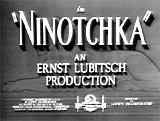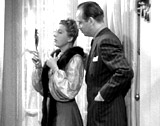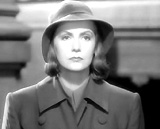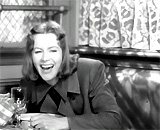
|
Ninotchka
(1939)
In Ernst Lubitsch's sophisticated romantic comedy (advertised
with the tagline "Garbo LAUGHS!" to specify it was her
first), a satire about both Stalin's Communism and western capitalism:
- the early scene of self-absorbed, ultra-sophisticated
noblewoman, Russian Grand Duchess Swana (Ina Claire), living in
exile in the French capital of Paris, who complained to her suave,
playboyish boyfriend Count Leon d'Algout (Melvyn Douglas) about
what her face looked like in the morning: "Oh, it's really
a wretched morning, wretched. I can't get myself right. I wanted
to look mellow and I look brittle. My face doesn't compose well.
It's all highlights. How can I dim myself down, Leon? Suggest something.
Oh, I'm so bored with this face. I wish I had someone else's face.
Whose face would you have if you had your choice? Oh well, I guess
one gets the face one deserves"
- the scene of somber and dour, plainly-dressed Russian
commissar Nina "Ninotchka" Ivanovna Yakushova's (Greta
Garbo) arrival at the Paris train station (after being dispatched
as a special envoy from Moscow, to find out what had happened to
three commissar comrades, the reason for the delay in selling the
confiscated imperial jewels (encased in the vault), acquired during
the Bolshevik Revolution, and originally owned by Grand Duchess Swana,
and to untangle any problems); she was met by a trio of Russian delegates/comrades
(Sig Rumann, Felix Bressart, and Alexander Granach), who apologized
for not bringing flowers because they didn't know she was female
- and she sternly and unsmilingly cautioned them to downplay her
sexuality and not act gallantly: "Don't make an issue of my
womanhood. We're here for work. All of us. Let's not waste any time.
Shall we go?" - and she refused to have a porter carry her bags
(and called his business "social injustice"); as she walked
off, she told them the news:
"The last mass trials have been a great success. There are going
to be fewer but better Russians"
- in the hotel lobby, she observed a ladies hat in the
showcase window of a hat shop and disparaged the Western capitalist
civilization that produced such a piece of frivolous and costly merchandise: "How
can such a civilization survive which permits their women to put
things like that on their heads? It won't be long now comrades";
later in the film, (in an insightful critique of Communism by the
director), she went to her locked, lower bureau drawer - knelt and
removed the hat that she had twice disapproved of in the showcase
window of the hotel lobby, and then had secretly bought; she held
it up, stared at it, moved over to the large, full-length mirror
in her bedroom and firmly placed the frivolous, cone-shaped hat on
her head with both hands; afterwards, she sat down, looked uncertainly
at herself, leaned forward and gazed at her new persona, and then
rested her chin on her hand

|

|
|
Observing Hat in Hotel Store Window
|
Observing Herself With Hat
|
- the scene of her meeting with dashing and persuasive
Parisian lover Count Leon when all she wanted was assistance in
holding her unfolded map of Paris to go to the Eiffel Tower to
learn about it from a "technical standpoint"; point-blank,
she told him: "I am interested only in the shortest distance
between these two points. Must you flirt?...Suppress it!"
- the first instance of Ninotchka saying her famous
line after being introduced to Leon's elderly, dignified butler Gaston
(Richard Carle): "The day will come when you'll be free. Go
to bed, little father. We want to be alone"
- the second instance in the film when Garbo stated
her famous wish to be alone:
"We want to be left alone"
- the attempted seduction scene in Leon's art-deco style
apartment, when she responded to his request for feedback: "Ninotchka,
you like me just a little bit?"
- and her reply: "Your general appearance is not distasteful...The
whites of your eyes are clear. Your cornea is excellent"; and
then her denial of his feelings of love: "Love is a romantic designation
for a most ordinary biological - or, shall we say, chemical - process.
A lot of nonsense is talked and written about it"
- Leon's continued charming and romancing of the cold
Ninotchka, when the clock struck twelve: "It's midnight. Look
at the clock. One hand has met the other hand. They kiss. Isn't that
wonderful?...Ninotchka, it's midnight. One half of Paris is making
love to the other half"
- Leon's failed attempt to arouse loving emotion in
Ninotchka: "Love isn't so simple, Ninotchka. Ninotchka, why
do doves bill and coo? Why do snails, the coldest of all creatures,
circle interminably around each other? Why do moths fly hundreds
of miles to find their mates? Why do flowers slowly open their petals?
Oh, Ninotchka, Ninotchka, surely you feel some slight symptom of
the divine passion? A general warmth in the palms of your hands,
a strange heaviness in your limbs, a burning of the lips that isn't
thirst but something a thousand times more tantalizing, more exalting,
than thirst" - she gave a cold reply: "You are very talkative" -
but he was finally able to plant a kiss on her lips - and asked: "Was
that talkative?"
- to which she replied with little feeling: "No, that was restful.
Again"; after being encouraged, Leon kissed her again and she
replied: "Thank you," and leaned back on the leather chair,
as he told her: "Oh, my barbaric Ninotchka. My impossible, unromantic,
statistical..."; she interrupted, took charge, and reciprocally
kissed him back; he commanded her: "Again," but a telephone's
ringing delayed any further kisses; she soon realized that he was the
enemy of her mission in Paris
- the celebrated cafe scene of dashing Count Leon d'Algout
attempting to melt somber and dour Russian commissar Ninotchka's
icy, stony-faced, humorless, impassive exterior and have her "laugh
from the heart" by telling her dumb jokes and stories in a restaurant;
when that utterly failed and she remained stone-faced without any
reaction, he leaned backward on the shaky table behind him and accidentally
toppled over in his chair, causing everything to crash to the floor;
he finally succeeded in making her laugh uproariously and uncontrollably-
she howled, threw her head back, and collapsed across the table,
pounding it with her hand; Leon slowly got up from the floor, recomposed
himself, and sat next to her, and then he recovered and broke down
into howling laughter with her; he saw the humor of the situation
and joined in everyone's laughter at his own expense
- the stinging repartee between the jealous Grand Duchess
Swana and Ninotchka when they met in Count Leon's presence; the Grand
Duchess cynically criticized Ninotchka's evening attire (she was
radiantly-dressed in a beautiful evening gown) ("Isn't it amazing?
One gets the wrong impression of the new Russia. It must be charming.
I'm delighted conditions have improved so. I assume this is what
the factory workers wear at their dances"), and also sarcastically
noted: "It's too bad you have so few more days here in Paris"
- the famous "execution" scene involving an
inebriated Ninotchka in her Royal Suite in the hotel with Leon; she
had become his ardent lover - drunk, happy and in love for the first
time; she was to be punished for betraying her Russian ideals and
replacing them with love and kisses ("No one can be so happy
without being punished. I will be punished and I should be punished.
Leon, I want to confess"); to fulfill her request to be shot
as a traitor for betraying "a Russian ideal," Leon stood
the tipsy Ninotchka up against a wall, blindfolded her with the napkin,
and then removed the champagne bottle's cork with a loud pop - she
reacted as if shot, sinking to the floor: "I've paid the penalty.
Now let's have some music"
- later in the film, the Grand Duchess became more worried
about the loss of her lover (the Count) to Ninotchka than her own
jewels, so she proposed a desperate bargain - to give the Soviets
the money from the sale of her gems if Ninotchka would immediately
return to Russia; she got her wish, and Ninotchka was dispatched
back to the humorless Russia, but then shortless later was sent on
an additional mission to Constantinople, Turkey to again monitor
the same three Russian comrades
- in the happy ending, the scene of the surprise rendezvous
of Ninotchka with Count Leon in Turkey, who confessed that he had
masterminded her departure from Russia ("They wouldn't let me
in so I had to get you out")

|

|
|
Happy Ending: Leon's Rendezvous with Ninotchka
in Turkey
|
Ending: Kopalski's Restaurant Picket Sign
|
- the last image of ostracized Kopalski (Alexander
Granach) picketing a co-owned Russian restaurant opened with his
comrades in Turkey with a sandwich board that read: "Buljanoff
and Iranoff Unfair to Kopalski"
|


The Russian Grand Duchess Complaining About Her Looks
to Leon

Trio of Russian Comrades-Delegates

Stern "Ninotchka" Yakushova (Greta Garbo)

Ninotchka with Count Leon (Melvyn Douglas)

"We want to be alone"





Mostly Failed Seduction Scene - A Few Kisses

Cafe Scene - Ninotchka LAUGHS

"Execution" Scene: Ninotchka Slumped To Floor
With Sound of Champagne Cork Pop

The Grand Duchess Blackmailing Ninotchka to Leave
Paris
|















